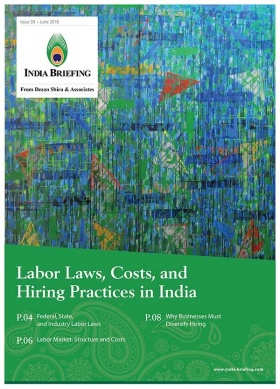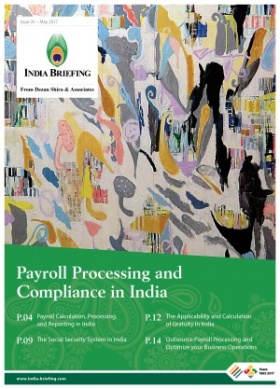Section 377: LGBT Rights and HR Policy in the Indian Workplace
Framing an LGBT-friendly human resource (HR) policy in the Indian workplace received a legal boost from the Supreme Court (SC) last month when in a landmark decision, the Court decriminalized homosexuality in the country.
On September 6, the SC unanimously struck down a part of Section 377 of the Indian Penal Code, to exclude all kinds of adult consensual sexual behavior.
In its judgment, the Court emphasized the fundamental right of homosexual persons to live with dignity, without the stigma attached to their sexual orientation, with equal enjoyment of rights under India’s constitution, and equal protection under the law.
Responsibility now falls on businesses and corporates in India to draft inclusive policies for the workplace.
This means implementing or reinforcing norms and rules that establish a safe and non-discriminatory work environment and promote diversity representation.
Establishing an LGBT-friendly workplace in India
Creating an environment where homosexual and genderqueer employees feel safe and proud to work and are respected and treated with dignity must be identified as a key goal by all organizations. This requires having in place policies that are not just aspirational but intolerant of abuse, discrimination, and exploitation. Implementing them successfully often involves a combination of communal dialogue, training, and awareness.
However, at the outset, companies should cover sexual orientation in their policies, during employee onboarding, and in the employee handbook. The company’s position should remain consistent across the board, and be communicated via a clear and explicit non-discrimination policy that lays the ground for building an inclusive organizational culture.
Confronting regressive norms is important and a continuous process. It is imperative that organizations hold periodic seminars, workshops, sensitization programs, and diversity initiatives to promote greater participation, support, and understanding among employees.
Employees looking to access mental health and other support services should be able to approach their HR teams, and information about these should be made easily available to all.
Members of the LGBT community are also frequently traumatized as they go about their daily lives. This is more so in conservative societies like India, where the public space is often an extension of the home, and sociocultural prejudices legitimize bullying and harassment.
Further, there is a difference between intellectually processing who are gay, lesbian, bisexual, transgender, and genderqueer folk and emotionally connecting with them as fellow beings. Discrimination generally emerges out of ignorance and unfamiliarity and changing old mindsets through meaningful interactions and sharing of experiences is equally necessary.
A way to achieve this is by hosting interactions with LGBT groups and having a support system in place within the organization. Just as what works best for women or addressing women’s concerns at the workplace means having women take the lead, similarly, straight (heterosexual) persons cannot be expected to fully understand the depth of LGBT concerns.
Additionally, there should be no acceptance of behavior in the workplace that can be construed of as direct or indirect harassment; in other words, the removal of grey areas. As we well know, legal empowerment is only a tool to promote social change – the doing or undoing of it lies in the hands of people.
This is where HR departments and company policies play a crucial part, and need to actively foster environments where language at the workplace, chain-of-command, or decision-making responsibilities are open and respectful, and not based on gender or identity association.
Such change requires continuous follow-up – it cannot be achieved through a single policy, action, or reaction.
For instance, besides promoting diversity in recruitment practices, cultivating a sensitized work environment, and establishing clear rules of conduct, companies across the industrial spectrum should begin the conversation on extending social and legal benefits to LGBT persons, such as medical benefits, insurance, etc.
Why inclusive HR policies work for all
India’s major metropolitan cities like Mumbai and New Delhi still fare relatively better in their treatment of the LGBT community than in other parts of the world. However, this has generally been the prerogative of a few leading multinational firms and Indian corporates. Firms with LGBT-friendly policies in place usually had to look behind their backs for fear of legal reproach. This fear no longer holds validity.
With the Supreme Court establishing the legal rights of members of the LGBT community, affirmative action policies pursued by various companies can be more direct and transparent. This is a breakthrough in of itself, but it also means that there is now a legal responsibility on the part of employers to foster an inclusive and sensitized workplace.
Yet, and this is no small generalization, drafting inclusive HR policies do not benefit the LGBT community alone. It impacts both the organization and society in fundamental ways.
India’s workplaces have for a long time betrayed social and cultural prejudices. For example, India has among the lowest female labor-force participation rates in the world.
Moreover, the domination of either mostly male workplaces or discrimination in hiring and promotions have propagated unhealthy working cultures and sociocultural attitudes.
This has led to conscious efforts on the part of the Indian government and corporates in India to push for gender-positive laws on hiring practices, access to social security benefits, boardroom representation, and promotions, as well as the deterrence of sexual harassment.
Coming at this juncture then, drafting an LGBT-friendly policy only strengthens ongoing efforts to make workplaces in India more inclusive, safe, and harassment-free.
It enables the workforce participation of diverse communities that can change entrenched management and decision-making processes, inject new ideas and perspectives into businesses, and remove uncompetitive barriers that kill innovation, leadership, and initiative.
About Us
India Briefing is produced by Dezan Shira & Associates. The firm assists foreign investors throughout Asia and maintains offices in China, Hong Kong, Indonesia, Singapore, Vietnam, and Russia.
Please contact india@dezshira.com or visit our website at www.dezshira.com.
- Previous Article Types of Audit and Audit Reporting in India
- Next Article #MeToo Movement in India: The Sexual Harassment Law and HR Best Practices










